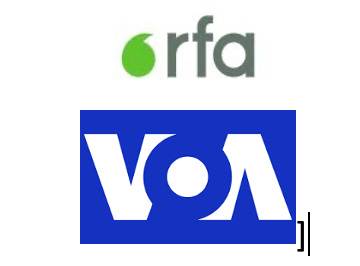How Shutting Down VOA and RFA Also Leaves U.S. Policymakers in the Dark
Foreign audiences are not the only ones being deprived of vital information on China
After taking time off due to flu season, snow days, travel, and writing deadlines, I am getting back in the swing of things. Today’s issue includes reflections on how the effective shuttering of Radio Free Asia (RFA) and Voice of America (VOA)—exactly one month ago—leaves an information gap not only for global audiences, but also for U.S. policymakers themselves.
You’ll also find show summaries covering Chinese Communist Party (CCP) online influence operations and elite capture in the Philippines. Lastly, I highlight the plight of a book publisher from Taiwan recently jailed in China. Thank you for reading and if you find this useful, please share with others.
How Shuttering VOA and RFA Blinds U.S. Policymakers to China’s Grassroots Realities
It has been exactly one month since U.S. president Donald Trump signed an executive order effectively shutting down U.S. funded broadcasters like Voice of America (VOA) and Radio Free Asia (RFA). Indeed, VOA’s website has not been updated since March 15, as staff remain on administrative leave, despite pending legal challenges. RFA—and its European counterpart Radio Free Europe / Radio Liberty (RFE/RL)—continue to post a small number of articles with limited staff. Nonetheless, the scale of coverage is a fraction of prior reporting, radio transmission stations are going offline, and it’s unclear how long even this limited functionality can continue.
The prospective shuttering of these outlets is a loss on many fronts, specifically for the audiences in heavily controlled and manipulated information environments who rely on them for uncensored news. But amid the commentary about the role these outlets play, one key audience has received less attention than is should—U.S. policymakers.
VOA and RFA (especially its Uyghur and Tibetan services) have been a vital source of information for America’s own decision-makers about what is happening on the ground in some of the world’s most authoritarian and closed societies. With many journalists being members of exile communities themselves, the outlets’ have a deep network of contacts to draw on for their reporting, far beyond what a foreign correspondent could manage. The ability to reach not only residents in closed-off regions like Xinjiang and Tibet, but also local officials, has enabled VOA and RFA’s reporters to verify incidents ranging from protests over environmental degradation to deaths in custody.
The relevance of RFA and VOA’s reporting to America’s elected officials and decision-makers is evident from the number of references in U.S. government reports. The China section of the 2023 U.S. State Department annual report on human rights published last April, for example, cites RFA or RFE/RL over a dozen times on topics ranging from surveillance, to prosecutions of grassroots Chinese activists, to forced labor in Xinjiang and refugees in Kazakhstan. That year’s annual report of the Congressional-Executive Commission on China references RFA and VOA a combined 342 times in its footnotes and text. The outlets’ reporting is used in the report to shed light on the jailing of Chinese activists, the persecution or religious believers, the CCP’s forced repatriation of North Korean refugees, and tightened controls in Tibet. But it is not only on human rights issues that the outlets’ reporting is relevant. The 2023 Annual Report of the U.S.-China Economic and Security Review Commission (USCC) includes 46 citations of VOA’s reporting and another 41 from RFA on topics ranging from China’s nuclear arsenal to tensions in the South China Sea to fallouts from PRC loans and infrastructure projects in Africa and Latin America.
The importance of these broadcasters for informing U.S. policymakers is also indirect. As a researcher, I have used their reporting to inform briefings and Congressional testimonies, in addition to being interviewed regularly. I first learned about the mass detention of Uyghurs in Xinjiang in 2017 from an RFA reporter, who called me for a comment and shared first-hand accounts of what she was hearing from family, friends, and others in the region.
On March 15, I was actually in the middle of working with VOA journalists on a small reporting project to document and spotlight the CCP’s transnational censorship tactics. It included creating a dataset of over 200 incidents from around the world—including in the United States—to help identify key trends, tactics, and actors involved. We will see if that project ever reaches completion—but it is presumably the kind of information that Members of Congress and the administration would find useful.
This isn’t to say there are no areas for potential reform, internal review (including, if needed, investigating individual incidents of perceived bias like those listed in the executive order), or inefficiencies caused by partly overlapping mandates and reporting topics between RFA and VOA’s Mandarin services. Meaningfully addressing such concerns, however, does not require full-scale shutdowns.
As Congress and the current administration consider what might be the future, if any, of these outlets, I hope they weigh the fact that they are not only cutting off a source of news for people on foreign shores or a boon for America’s reputation abroad. They are also taking an ax to a unique—and in many ways irreplaceable—source that informs their own briefing books, staff memos, witness testimonies, and legislative agenda.
What I’m Reading: Graphika report and Duterte-China book
Graphika’s latest report on Chinese state influence: This report, published in March, tracks the online activity of both Chinese state media and diplomats , as well as fake accounts from the PRC-linked Spamouflage network. Citing four recent case studies from February and March 2025, it highlights how these Beijing-backed online assets seek to amplify emerging divisions and policy disagreements between the U.S. and its allies—including over tariffs—to serve China’s diplomatic interests. This fits with longer-standing patterns of CCP online influence operations not being limited to disinformation (i.e. spreading of falsehoods) but also aiming to sow discord and amplify pre-existing anti-American sentiment. The cybersecurity firm predicts: “Chinese state influence actors will almost certainly continue with this and related messaging efforts as Beijing seeks to undermine support for the U.S. and capitalize on opportunities to advance its own diplomatic agenda.”
Unrequited Love: Duterte’s China Embrace: This book—authored by scholar Marites Vitug and journalist Camille Elemia—came out in September 2024, but I have only had time to dive into it recently. I had the pleasure of working with Camille on the Freedom House Beijing’s Global Media Influence project so it’s been on my list. The pair have done an incredible job digging out both meaningful anecdotes and well-documented details of former Philippines’ president Rodrigo Duterte’s evolving views of China (and the United States, for that matter) and the full scope of the Philippines’ closer ties with Beijing during his rule, weaving them together in a readable and well-informed style. The book especially offers a real-world case study for how apparent PRC-driven “elite capture” is a two-way street, combining CCP influence tactics with proactive agency on the part of the target country’s leaders. With Duterte back in the news given his arrest last month and forthcoming prosecution before the International Criminal Court, I thought this would be good timing to share. (Bonus tip: The book is included in the Kindle Unlimited library).
Prisoner to remember: Publisher Li Yanhe
Li Yanhe (pen name Fu Cha) grew up in Liaoning Province but relocated to Taiwan in 2009, where he started Gusa Press, a publishing house that published Chinese-language books and translations, including on topics critical of the Chinese government. He also hosted a program on the Taiwanese-government funded outlet Radio Taiwan International.
In March 2023, Li was detained in Shanghai when he returned to visit relatives and cancel his Chinese household registration after becoming a Taiwanese citizen. In one of the latest cases of someone being prosecuted on the mainland for dissent and free expression activities undertaken in Taiwan, on March 26, he was sentenced to three years in prison. As Australian journalist Louisa Lim—whose Chinese translation of her book The People’s Republic of Amnesia Gusa Press published—notes, “this move is designed to intimidate publishers in Taiwan.” Given this precedent, the Taiwanese government might consider allowing exemptions on a case-by-case basis from the Chinese household registration cancellation for Chinese-turned-Taiwanese citizens who might be at risk of arrest in China due to their political activism in Taiwan.




